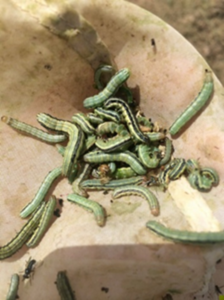I’ve been asked several times over the past week if armyworms are beginning to appear in Tennessee. There are a FEW isolated cases of fall armyworms infesting crops planted for wildlife, mainly millet. The instance and number of worms being found thus far is normal. Tennessee will still have armyworms that migrate North and infest pastures, food plots and the occasional yard. However, the wormageddon that happened in 2021 was a very unique event and will not occur yearly.

Fall armyworms don’t overwinter in Tennessee and populations migrate North from Texas and Florida every year. The difference in 2021 vs 2022 is the conditions that were occurring in April and May in South Texas. Texas experienced a warm and unseasonably wet spring that allowed for the proliferation of extremely large numbers of armyworms. Large numbers of moths plus ample food supply in pasture grasses, fallow grasses, yards and pretty much anywhere that had grass allowed this “army” to make its way North. Texas experienced outbreaks first followed by Louisiana, Arkansas, Mississippi then Tennessee with the moth flight culminating, in Canada, in November. I ask my colleagues, in Southern states, weekly if they are seeing any armyworms or anything resembling what happened in 2021 and the answer has consistently been no.
If we do see armyworms it shouldn’t be assumed that pyrethroids won’t be effective. We don’t fully understand why pyrethroids provided inconsistent control last year. Resistance is a possibility but overlapping generations causing mixing of various worm sizes resulting the appearance of poor control is another possibility. Finally, since armyworms don’t overwinter in Tennessee and there is no evidence of reverse migration, the armyworms we experienced last year won’t be the same ones we see this year.
One final note to homeowners, don’t fall for companies trying to sell you an “armyworm preventative” lawn treatment. Most products that are utilized for fall armyworm outbreaks, in lawns, have limited residual efficacy and shouldn’t be applied if armyworms aren’t present. Insecticide residual, even in a systemic product, grows out with your grass. If you mow your lawn on a regular basis any residual insecticide is mowed off and new growth isn’t protected. Applying an insecticide for an insect that isn’t there in the first place or may never show up, isn’t IPM and is a waste of money. Your county agent is an excellent resource for information pertaining to armyworm control in home lawns and pastures and won’t try to sell you anything.

